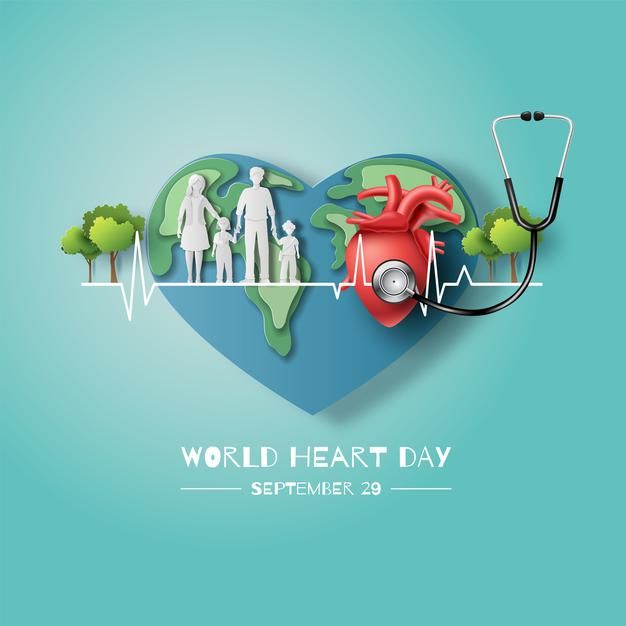World Heart Day: Celebrating and Protecting Your Heart
Introduction
Every year, on September 29, the world comes together to observe World Heart Day, a global event aimed at raising awareness about heart disease and its prevention. Established by the World Heart Federation (WHF) in 2000, this day encourages individuals to take proactive steps toward a healthy lifestyle, aiming to reduce the risk of heart disease and promote heart health across the globe. With cardiovascular diseases (CVDs) being the leading cause of death worldwide, World Heart Day serves as an urgent reminder of the importance of heart health for people of all ages.
History of World Heart Day
World Heart Day was founded by the World Heart Federation to raise awareness about the importance of heart health. Its origins date back to 1999, when the World Health Organization (WHO) recognized the global impact of cardiovascular diseases and their prevention. By observing World Heart Day annually, the WHF sought to promote healthier lifestyles, educate the public about the risks of heart disease, and ultimately reduce the burden of CVDs around the world.
The first official observance of World Heart Day took place in 2000, when health organizations, governments, and medical professionals united to amplify their message. Since then, it has grown into a global movement, with thousands of events, campaigns, and activities held worldwide to educate people on how to take care of their hearts.
Key Facts About World Heart Day
- Global Impact: Cardiovascular diseases, including heart disease and stroke, account for around 17.9 million deaths each year, which is nearly 31% of all global deaths. This makes CVDs the leading cause of death worldwide.
- A Day to Raise Awareness: The primary goal of World Heart Day is to raise awareness about heart diseases, their risk factors, and the simple lifestyle changes people can make to reduce their risk.
- Themes and Focus: Every year, World Heart Day has a specific theme that focuses on different aspects of heart health. Past themes have included “Use Heart to Connect” and “Heart to Heart”, which encourage individuals to take responsibility for their own heart health while supporting others.
- Heart Disease Risk Factors: Common risk factors for heart disease include high blood pressure, high cholesterol, smoking, obesity, physical inactivity, and unhealthy diets. Managing these factors can significantly reduce the likelihood of developing cardiovascular diseases.
- Global Participation: World Heart Day is celebrated in over 100 countries, with more than 90 national and regional heart organizations participating. This makes it one of the largest health observances in the world.
Significance of World Heart Day
- Reducing Heart Disease Mortality: The observance of World Heart Day brings attention to the importance of making heart-healthy choices. By promoting healthier lifestyles and preventive measures, the day helps save lives by reducing the number of heart disease-related deaths.
- Education on Prevention: World Heart Day provides an opportunity to educate people on the risk factors for heart disease and how to prevent them. With proper education, individuals can make informed decisions to improve their heart health, such as exercising regularly, eating balanced meals, and avoiding tobacco.
- Encouraging Healthy Habits: World Heart Day encourages people to make heart-healthy changes, such as quitting smoking, exercising more, and eating better. The day serves as a reminder that small changes can lead to a healthier life and reduce the risk of heart disease.
- Highlighting Cardiovascular Health for All Ages: Although heart disease is often associated with older adults, it is important to remember that it can affect people of all ages. World Heart Day emphasizes the importance of cardiovascular health at every stage of life, especially for younger individuals who can adopt heart-healthy habits early.
- Advocating for Policy Change: World Heart Day also brings attention to the need for policy changes to prevent heart disease, such as improving access to healthcare, encouraging healthier food options, and creating environments that support physical activity.
How to Observe World Heart Day
- Educate Yourself and Others: On World Heart Day, take the time to learn more about heart disease, its risk factors, and how you can protect your heart. Share your newfound knowledge with friends and family to help raise awareness in your community.
- Participate in Events: Many organizations and health institutions hold events, such as heart health screenings, exercise challenges, and educational workshops. Participate in these activities to learn more about your heart health and join the global movement for healthier hearts.
- Make Heart-Healthy Changes: Use World Heart Day as a reminder to take steps toward a healthier lifestyle. Start by adopting a balanced diet, incorporating more physical activity into your daily routine, and reducing stress.
- Support Heart Health Organizations: Consider donating to organizations that promote heart health, fund research, or offer support to individuals with heart conditions. Your contributions can help save lives and further the mission of World Heart Day.
- Spread the Message on Social Media: Use social media to raise awareness about heart disease and the importance of heart health. Share tips, facts, and messages using the hashtag #WorldHeartDay to inspire others to make positive changes in their lives.
Important Points
- Heart Disease Affects Everyone: While heart disease is often seen as an issue for older adults, it can affect people of all ages. Young people are also at risk due to lifestyle choices such as diet and lack of physical activity.
- Prevention Is Key: Many forms of heart disease can be prevented through lifestyle changes, such as quitting smoking, eating a healthy diet, exercising regularly, and managing stress levels. World Heart Day focuses on prevention and education to reduce the global burden of heart disease.
- The Role of Healthcare Providers: Healthcare professionals play a vital role in educating patients about heart disease risk factors and preventive measures. On World Heart Day, consider reaching out to your healthcare provider for a check-up or heart health screening.
- Heart Health for Future Generations: The lessons learned on World Heart Day can benefit future generations. By promoting heart-healthy habits today, we can ensure a healthier future for our children and grandchildren.
FAQs
1. Why is World Heart Day important?
World Heart Day is important because it raises awareness about heart disease, educates people on prevention, and encourages lifestyle changes that can reduce the risk of cardiovascular diseases.
2. What are some risk factors for heart disease?
Common risk factors for heart disease include high blood pressure, high cholesterol, smoking, obesity, lack of physical activity, and poor diet.
3. How can I improve my heart health?
To improve heart health, focus on maintaining a balanced diet, exercising regularly, quitting smoking, managing stress, and controlling blood pressure and cholesterol levels.
4. How can I celebrate World Heart Day?
You can celebrate World Heart Day by educating yourself and others, participating in heart health events, making heart-healthy changes, and supporting heart health organizations.
5. What is the theme for World Heart Day this year?
The theme for World Heart Day changes every year. It focuses on different aspects of heart health, such as prevention, education, and reducing heart disease-related deaths.
Conclusion
It serves as a powerful reminder to prioritize heart health and take steps toward a healthier lifestyle. With heart disease remaining a leading cause of death globally, this day emphasizes the importance of prevention, education, and lifestyle changes. Whether through participating in events, spreading awareness, or adopting heart-healthy habits, we can all contribute to the fight against cardiovascular diseases and ensure that our hearts stay healthy for years to come.










